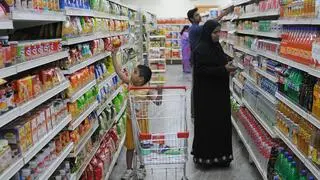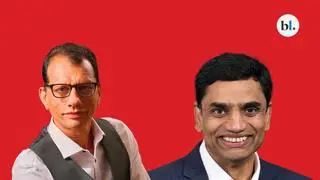“I have more than two billion tonnes of limestone reserves and our company will last for several more decades — as long as cement is used as a construction material,” declares N Srinivasan, Vice Chairman and Managing Director of India Cements Ltd (ICL).
The largest cement manufacturer in South India is celebrating its 75th anniversary and readying for the next growth phase. As demand for cement returns, thanks to a slew of infrastructure projects, ICL is reviving its capital expenditure plan in Rajasthan to tap new markets.

Five phases
ICL’s journey has seen many ups and downs. But cricket has remained a fellow traveller throughout. “You can’t take cricket away from India Cements,” N Srinivasan, or NS, as he is popularly known, says. As chairman of the Board of Control for Cricket in India (BCCI) and the ICC (International Cricket Council), Srinivasan’s influence on India’s favourite game was — and remains — enormous. At the company, he has been at the crease for over 53 years. His innings can be divided into five phases — control era, decontrol phase, stability and growth phase, cricketing era, and the post-Covid-19 times.
Of course, NS’s journey, in both cement and cricket, had its fair share of controversies. He was accused of leading cartelisation and price increases but stood his position. “He is not someone who will buckle under pressure because he knows the economics of cement-making as a highly capital-intensive one with demand being cyclical. He had a broader vision for the industry,” says Sandip Ghose — Corporate Strategy Advisor and cement industry veteran.
In cricket too, as BCCI chief, he exhibited similar tenacity when powerful lobbies worked against him. “I will not be bulldozed or railroaded into resigning,” he said then. His son-in-law was accused of match-fixing and a probe was initiated against NS. “Not even one trial has been held and not even one fellow has been questioned in the case. Ultimately, my points were proved right,” says Srinivasan.
Rupa Gurunath, his daughter and Director, India Cements, says her father has always been ahead of times. Under his leadership, ICL grew almost tenfold.
Tough negotiator
NS’s ability to manage labour relations helped not just India Cements but the whole industry. Before cement was decontrolled in 1989, the industry had a Wage Board structure. NS led a wage settlement pact in 1992 and, for the first time, the cement industry signed an agreement with all the labour federations. Since then, the NS-led cement body has signed eight wage pacts with the unions.
Co-founded by Srinivasan’s father, TS Narayanaswami (TSN) and Sankaralinga Iyer, India Cements was incorporated in February 1946 in technical collaboration with FLSmidth & Co of Denmark. The Second World War had ended, and it was a time to rebuild in a country on the cusp of freedom. In 1947, ICL created waves by going for an initial public offering (IPO) of ₹1 crore, making it perhaps the first Indian firm to do so. The issue was oversubscribed.
Under TSN, the company’s first factory at Sankarnagar, in present-day Tamil Nadu, commenced production in 1949.
Operations expanded over the next two decades. Decontrol of distribution helped ICL ramp up its capacity considerably.
In 1966, ICL took over the historic Chennai cricket club Jolly Rovers, setting up private cricket grounds and running matches.
Googlies galore
The sudden demise of TSN at the age of 57 in 1968, saw NS drawn prematurely into ICL; the 23-year-old was forced to cut short his postgraduate studies. It was a challenging time for the cement business, even as unrest was brewing between family members. NS was removed from the post of MD in 1979.
Meanwhile, armed with a new government policy for foreign institutional investors (FIIs), ITC attempted a takeover. NS moved swiftly to not only halt the takeover bid using a High Court injunction but also reversed the 45 per cent stake sale to ITC with the help of his friends and others. “My father worked so hard for the growth of India Cements... how could I let it go?” says Srinivasan.
In September 1989, 10 years after he was removed from the company, he returned as Managing Director. But the company was not in good shape.
The turnaround
NS embarked on an expansion — both organic and inorganic — to turn around the company.
In a bold move, ICL acquired the one-million-tonne Chilamkur plant of Coromandel Fertilisers, gaining access to the Andhra Pradesh market.
“It was one of the earliest takeovers in Indian cement and heralded the concept of takeover as a route to growth,” recalls TS Ragupathy, former executive president of ICL.
In 1994, NS’s $50-million GDR issue was over-subscribed. It was the first such foray to obtain capital not from banks but the capital markets, he says.
That set off several daring expansion moves. Apart from greenfield projects there were takeovers too, including the historic purchase of Raasi Cements, in 1999. By 2000, ICL’s production capacity touched 7.6 million tonnes a year and its revenue ₹1,000 crore.
But softening demand for cement led to losses and debt. ICL defaulted on repayments amid pressure from lenders.
It sold one of its acquisitions, Vishnu Cements, embarked on a corporate debt restructuring programme in 2003, shed manpower, cut production costs, and sold assets. By 2008, it gradually returned to growth.
New pitches
ICL’s launch of a waste heat recovery system at its Vishnupuram factory in 2004 was the beginning of a landmark energy conservation effort.
NS’s involvement in cricket deepened. He undertook bold reforms — he upgraded infrastructure, and took care of the needs of retired cricketers — at the Tamil Nadu Cricket Association as well as the BCCI. When BCCI introduced the Indian Premier League, ICL bid for the $91-million Chennai franchise in 2008, creating Chennai Super Kings with MS Dhoni as skipper.
As the CSK and Dhoni brands soared with success, ICL added grinding units in Tamil Nadu and Maharashtra, and its eighth integrated cement plant at Banswara (Rajasthan) in 2011.
Post-Covid-19 plans
As recession hit in 2016-17, ICL started slipping again. Even as the pandemic tightened money supply, the company managed to reduce its fixed costs to ₹150 crore from ₹195 crore per quarter. With increased prices, it moved into the cash-and-carry model. “We will end with a good profit in FY21,” says NS.
In 2020-21, after repaying ₹520 crore, his total debt would be down to ₹3,000 crore.
“In this, ₹200 crore is interest-free sales tax loan, ₹600-700 crore is working capital... my long-term debt will be ₹2,100 crore for a capacity of 16 million tonnes. My debt-to-equity ratio is 0.5,” he says. In FY21, he plans to repay ₹600 crore debt.
Meanwhile, a new factory project beckons in Madhya Pradesh. NS foresees demand growth over the next 3-4 years. “Today I sell in five southern states, Gujarat, Rajasthan, Madhya Pradesh, Orissa, Jharkhand, West Bengal and Assam, among others. With the new factory at MP, we will go pan-India.”
With better prices, cost control, and expansion, the company is batting in top form now. A century awaits.







Comments
Comments have to be in English, and in full sentences. They cannot be abusive or personal. Please abide by our community guidelines for posting your comments.
We have migrated to a new commenting platform. If you are already a registered user of TheHindu Businessline and logged in, you may continue to engage with our articles. If you do not have an account please register and login to post comments. Users can access their older comments by logging into their accounts on Vuukle.